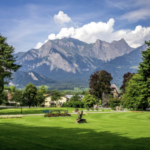Creativity and innovation nowadays are consumers’ common demand, product lifespan has been shortened. People pursue newness, and abandon history. History has become something of the past and can only be found in the museums, books and documentaries. However, the present is an accumulation of history; the development of present time is established by the past.
- The concept of The Passage hotel is for customers to experience/learn history.
The difference in time from different countries/continents in a luxury way. Bringing customers unprecedented accommodation by combining luxury and historical ambience including interior design, furniture, and staff service. Make customers realize the beauty of history, feel grateful for what we have now and appreciate the contribution of our ancestors.
The hotel “Passage” is not just a luxurious themed hotel. It is a hotel with multiple themes: one room could be a Victorian era design with pointed arch door surround; one could be a house from Tang dynasty with the upturned eaves, heavy glazed and colored tile covering. Each room has its own character and shows the development of the era.
The staff play a vital role in the hotel as explanations/guides of the era in the rooms will be provided by them. Bringing hotel service to a new level not just the norm.
One characteristic of the hospitality industry (particularly when it comes to tourism in Asia-Pacific) is “inseparable” meaning products (accommodation, gourmet etc.) and services cannot survive independently. Therefore, Passage provides customers the inseparability of services with newness and style.
The hotel will be renovated to a boutique style hotel, from a 7-storey building (exiting old hotel) with top floor for penthouses, mezzanine floor for restaurant with different cultural sections and ground floor for concierge, lobby, pool, bar and a conference room. The floor distribution from 1st to 5th floor will be Asia, America, Europe, Africa, Oceania and 6th floor penthouse: Singapore and Antarctica. Each floor/room will be focused on the physical attributes of its continents/countries.

- The front desk staff are responsible for check-in/out, book a room tour time with guests during check in.
The company’s business involves innovation with the aim of capturing value for our stakeholders through new experiences. Our company’s business model is customer-based and service-oriented, through a joint venture with the former leadership of the Hotel Supreme to create a successful business. There are 5 ways of business innovations: offering new products, new ways to organize business, new methods of production, new sources of supply and exploitation of new markets. Our company shall embrace the first three ways of innovation through creation of value in new service based on tradition and culture. Uniqueness based on differentiation business strategies are all ways of endorsing a successful business model for The Passage hotel. A good service-oriented and customer-based business strategy that incorporates the three phases as shown below will enable our business to be profitable and a market challenger.
A business strategy signifies a company’s current operations that provide competitive advantage as well as future aspirations through common goals and objectives.
Differentiation business strategy focusing on unique and distinctive features of the product and service to offer memorable experiences for customers. The hotel offers uniqueness through cultural integration of cultures and traditions from around the world. A high number of tourists have not been to the Antarctica and a visit to the Antarctica penthouse will give them a brief understanding of the culture and environment.
The organization has conducted great research in the business industry using well renown tools such as the Porter’s five forces, Pestle and SWOT analysis for an effective business plan, decision making and a better understanding of the business environment. Firstly, we shall look at the Porter’s five forces:
Hotel chains are at advantage due to being able to reduce cost of management and advertising when operating on a global scale, which leads to difficulty for new companies to enter and compete in the market. In addition to this, large capital outlay is also a barrier for new entrants especially the small and medium businesses. In Singapore, it is required for new hotels to apply for registration and license from The Hotels Licensing Board and to meet certain standards to be able to obtain the license.
As Singapore is known for its small land size, hotels and other properties are usually in close proximity. Hence, direct and indirect competitors in the area are considerably high. In addition, the expansion strategy of large hotel chains by diversifying their hotel locations intensifies the competition in the market and creates challenges for small and domestic hotels. This is particularly so in a country with such a high number of international tourists like Singapore, which is also true in many other countries in terms of tourism in Asia-Pacific.
The lodging industry is expanding as there is a high range of options available now including Motels, bed and breakfast, serviced apartments, glamping and different levels of hotels ranging from luxury to upper midscale, midscale to budget. Hence, the threat of substitutes is high. Airbnb is the most significant threat to the hotels both luxury and economic. Data from the previous year showed Airbnb listings alone is over 6 millionwhich is higher than the combined numbers of the top 5 largest global hotels. In Singapore, Airbnb is also gaining attention for its wide range of available accommodation options which is especially appealing to millennial travelers.
Since the hotel industry is labor-intensive and service quality can be greatly influenced by staffing and availability of staff, it is critical for the hotels to ensure the supply of staff is sufficient. Therefore, in that regard, supplier power is high. However, Singapore does not have a legislation for minimum wages which then lowers the power of suppliers. Other departments like food and beverage within the hotel also require high quality of supplies (fresh produce), nevertheless, there is a wide variety of suppliers available. Overall, the bargaining power of suppliers is medium.
“The switching cost for buyers is negligible, which means switching from one hotel to another does not incur any costs. Moreover, the convenience of using an online reservation and cancelation system also enhances the buying power of the buyers. The fact that supply has exceeded demands for accommodation in the area is also gaining the buyers’ power.”










